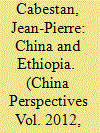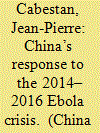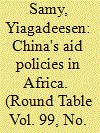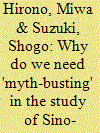|
|
|
Sort Order |
|
|
|
Items / Page
|
|
|
|
|
|
|
| Srl | Item |
| 1 |
ID:
116545


|
|
|
|
|
| Publication |
2012.
|
| Summary/Abstract |
Since 1995, China and Ethiopia have gradually forged close relations. On both sides, the establishment of this partnership was motivated as much by diplomatic, strategic, and even ideological considerations as by economic ones. For Beijing, economic and trade cooperation with Addis Ababa is a means rather than an end in itself. For Ethiopia, however, partnership with China mainly serves the internal political and economic purposes of the regime that has been in place since 1991, under Prime Minister Meles Zenawi for 20 years and, since his death in August 2012, under his successor Hailemariam Desalegn. The relationship is characteristic of the special but asymmetrical links Beijing has sought to establish with countries of the South that are strategically important but economically backward. It also illustrates the attraction the "Chinese model" of development holds in Africa and elsewhere.
|
|
|
|
|
|
|
|
|
|
|
|
|
|
|
|
| 2 |
ID:
178170


|
|
|
|
|
| Summary/Abstract |
The 2014–16 Ebola crisis in West Africa was China’s very first opportunity to demonstrate its willingness and ability to play a meaningful role in addressing public health emergencies of international concern. China’s decision to participate in the international response to the outbreak was part of an ambition to enhance its contribution to Africa’s security in general and health security in particular and to exert more influence on global norms. The specific role played by the People’s Liberation Army (PLA), especially its Academy of Military Medical Sciences, in Sierra Leone and Liberia is part of an ongoing effort to increase China’s involvement in international humanitarian assistance and disaster relief operations. It was the first time that it sent medical military teams to set up and operate infectious disease hospitals overseas. This participation also underscores the PLA’s crucial role in fighting epidemics overseas as well as at home, as the current COVID-19 pandemic illustrates. The Ebola crisis enables us to explore aspects of the PLA’s overseas missions, some of which are humanitarian and others which generally enhance China’s influence as a great power in Africa and in the world in the context of a growing Sino-US strategic competition.
|
|
|
|
|
|
|
|
|
|
|
|
|
|
|
|
| 3 |
ID:
093954


|
|
|
|
|
| Publication |
2010.
|
| Summary/Abstract |
Since the Beijing Summit of the Forum on China-Africa Co-operation in 2006, China's renewed interest in Africa has garnered a lot of attention and generated a lot of debate. Western media and analysts have, perhaps not surprisingly, been generally very critical of China's rising influence in Africa. The African reaction, however, has been more mixed. African leaders have welcomed what they see as a new approach to development and increased potential for meaningful South-South co-operation. African civil society groups have been more cautious and are worried about the possible negative repercussions on governance, the environment, human rights and overall economic development. This paper focuses on Chinese foreign aid to Africa and discusses the opportunities and challenges that it presents for China, the African continent, and the international community. This allows the uncovering of many misconceptions regarding the potential impact (whether positive or negative) of this renewed interest by different parties. The paper argues that if one adopts an approach that puts ordinary Africans first, at the centre of development, then the only option available to us is to engage China in a constructive partnership in order to make its aid effective.
|
|
|
|
|
|
|
|
|
|
|
|
|
|
|
|
| 4 |
ID:
130417


|
|
|
|
|
| Publication |
2014.
|
| Summary/Abstract |
The literature on Sino-African relations has debated whether or not China's growing presence is a threat to Western or African interests, and has come to the conclusion that China's behavior is not uniquely immoral. Many countries, including Western liberal democracies, similarly give aid to local autocrats to secure natural resources. Why, then, has so much effort been made to come to this perhaps unsurprising conclusion? We argue that the literature on Chinese foreign policy remains heavily influenced by Western states' policy interests, resulting in an impoverished debate that is primarily concerned with the idea of a China threat. In order to recover the diversity in our research on Chinese foreign policy, we argue for the need to go beyond the confines of Western strategic interests.
|
|
|
|
|
|
|
|
|
|
|
|
|
|
|
|
|
|
|
|
|